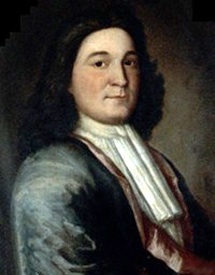Governor Phips: historically obscure, but the British knight ran the Witch Trials in his colonial territory.
Once again, Blog Scarriet, this time with almost the ease of a yawn, sets the whole world straight on something of much notoriety and importance.
The Salem witch trials do not properly belong to Salem, Massachusetts at all.
We do not refer to the quibble that hearings took place in other Massachusetts towns, that hangings took place in nearby Danvers, that judges were from Boston, or some other minor factual matter.
No, the issue is far more prominent: the Salem Witch Trials, as they are known, do not properly belong to American history; they belong to British history.
The famous trials which put 20 people, mostly women, to death, in 1692, were conducted by British officials in a British Colony run by the British.
The Trials, in the popular imagination, are inevitably used as an example of American religious extremism, which eclipsed due process in an orgy of superstitious mayhem, and yes, it is true, ‘seeing ghosts’ was the primary evidence against the accused.
The facts are these:
The trials could not commence until the British Crown created a new charter for their Massachusetts colony: this finally happened, after a lapse of many years due to religious strife in England, in 1692—the year in which all the trials and deaths occurred.
The man who put the trials together, whose authority made them happen, was William Phips, famous in London for recovering, as a British treasure hunter, a large treasure from a Spanish galleon. His successful treasure hunt earned him three things: wealth, a knighthood from the British Crown, and appointment to the 1st Governor of Massachusetts Bay.
Phips, a British knight, was the chief magistrate of the witch trials. Without his authority as British colonialist, the “Salem Witch Trials” simply don’t happen. Phips, neither refined nor educated, will die in London, on trial himself, for assault. If you don’t recognize his name, it’s because focus on Governor Phips gives an entirely different historical slant to the trials.
Was the witchcraft charge against Phips’ wife the reason the whole ugly charade was shut down months after it began?
It’s really not that difficult to be an historian.
We suggest Hollywood do a film on Phips: a colorful character; the so-called Salem Witch Trials would be just a backdrop, one episode, in his amazing life.
And also, it wouldn’t be a fail when they cast a British actor for an American role.
Salem was a great, early American maritime, city; with its ad hoc, privateer navy, Salem merchants, by themselves, captured 450 British vessels during the Revolution—a crucial way to fund a rebellion.
If this doesn’t happen, we probably don’t win the Revolution, and America doesn’t exist.
And yet Salem is known—for witches.
It makes you wonder who is writing our history.
The treasonous Thomas Jefferson’s embargo, as U.S. President, destroyed Salem as a maritime power; it is probably why the writings of the young Hawthorne, growing up in depressed Salem in the beginning of the 19th century, were so dark.
Here is the true darkness of Salem.
Not the Witch Trials.
They belong to an English knight.
